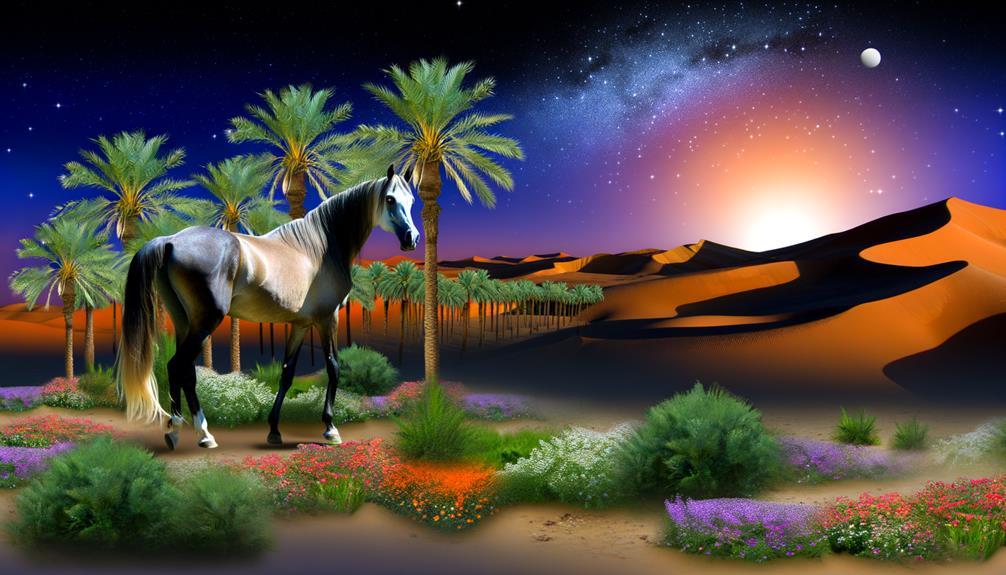Meaning of the Name Maha
The name Maha originates from Arabic and Sanskrit, signifying beauty, grace, and nobility. In Arabic, it derives from "māhā," meaning 'wild cow' or 'oryx,' admired for its elegance.
Historically, Maha also translates to 'great' or 'mighty' in Sanskrit, further enriching its cultural depth. This name is widely celebrated in the Middle East and South Asia, symbolizing resilience and fortitude.
Its phonetic simplicity and melodic quality contribute to its popularity. Representations in media and literature have bolstered its contemporary relevance.
To uncover the intricate layers of meaning and cultural significance, further exploration of its historical and modern contexts is enlightening.

Key Takeaways
- Derived from Arabic, 'Maha' means 'wild cow' or 'oryx,' symbolizing beauty and grace.
- In Sanskrit, 'Maha' translates to 'great' or 'mighty,' indicating grandeur and nobility.
- The name reflects cultural richness and deep historical resonance.
- Popular in Arabic-speaking regions and South Asia due to phonetic simplicity and melodic quality.
- Celebrates traits like beauty, strength, resilience, and elegance across generations and geographies.
Origins and Etymology
The name Maha originates from Arabic, where it is derived from the word 'māhā,' meaning 'wild cow' or 'oryx,' symbolizing beauty and grace in Arabic culture.
Historically, the oryx was admired for its striking appearance and elegant movements, attributes that were metaphorically extended to individuals named Maha.
In Arabic linguistic tradition, names often encapsulate desirable traits, and 'māhā' is no exception. The term also carries connotations of purity and nobility, reflecting the socio-cultural values of the time.
Linguistically, 'māhā' is rooted in classical Arabic, a language known for its rich semantic layers and historical depth. This etymological background underscores the name's enduring appeal and its significance in Arabic-speaking communities.
Cultural Significance
The name Maha carries profound cultural significance, deeply rooted in historical contexts and origins. Its symbolism varies across different cultures, often representing grandeur, nobility, and splendor.
Historical Context and Origin
Rooted in ancient Semitic languages, the name 'Maha' holds profound cultural and historical significance, particularly within Arabic-speaking communities.
The etymology of 'Maha' can be traced back to the Arabic word for 'wild cow', symbolizing beauty and grace in classical Arabic poetry and literature.
Historically, the name has been used to evoke qualities of elegance, strength, and natural beauty, resonating deeply in the cultural narrative.
Linguistic studies reveal its alignment with other Semitic languages, indicating a shared cultural heritage.
The name's persistence over centuries highlights its enduring appeal and importance. Its usage in historical texts and oral traditions underscores a rich cultural legacy, making 'Maha' not merely a name but a repository of historical and linguistic heritage.
Symbolism in Various Cultures
Across diverse cultures, the name 'Maha' embodies multifaceted symbolism, reflecting a tapestry of meanings that transcend its linguistic roots.
In Arabic, 'Maha' signifies 'wild cow,' symbolizing grace and beauty.
In Sanskrit, 'Maha' means 'great,' often used as an honorific for deities and revered figures, denoting grandeur and reverence. Within Hinduism, 'Maha' prefixes many sacred terms, such as 'Mahatma,' enriching its spiritual significance.
Similarly, in Swahili, 'Maha' conveys a sense of vastness or largeness, often linked to the expanse of the ocean.
Each cultural interpretation imbues 'Maha' with unique dimensions, illustrating how a single name can encapsulate diverse conceptual landscapes and historical layers, thereby enriching its global resonance.
Historical Context
Emerging from ancient languages, the name Maha holds significant historical and cultural resonance across various civilizations. Rooted in Sanskrit, the term 'Maha' translates to 'great' or 'mighty,' often associated with grandeur and divinity.
In Arabic, 'Maha' signifies 'wild cow,' symbolizing beauty and grace. Historical texts, from Vedic scriptures to Middle Eastern literature, frequently reference Maha, underscoring its enduring significance.
In South Asian cultures, Maha prefixes epithets for deities and monarchs, indicating reverence and sovereignty. Similarly, in the Islamic world, it is a name imbued with poetic and cultural connotations. The significance of the name Safiya in Islamic culture represents purity and sincerity. It is often given to girls with the hope that they will embody these qualities throughout their lives. In this way, names hold deep meaning and symbolic importance in various cultural and religious traditions.
This linguistic versatility highlights how the name Maha transcends temporal and geographical boundaries, embodying a complex tapestry of meanings and traditions throughout history.
Popularity and Usage
The name Maha exhibits a geographically diverse distribution, prominently found in regions such as the Middle East and South Asia, reflecting its historical and linguistic roots in Arabic and Sanskrit.
In modern times, the name enjoys significant cultural resonance, often associated with attributes of greatness and nobility.
This combination of historical depth and contemporary relevance underscores its enduring appeal across different cultures and societies.
Geographic Name Distribution
Frequently found in regions with significant Arabic-speaking populations, the name Maha enjoys considerable popularity and usage, especially in countries such as Egypt, Saudi Arabia, and the United Arab Emirates.
Historically, the name Maha, deriving from the Arabic word for 'wild cow,' symbolizes beauty and grace, which are highly esteemed qualities in these cultures. The linguistic richness of the Arabic language ensures that names like Maha resonate deeply within communities, carrying cultural and familial significance.
In addition, the name's phonetic simplicity and melodic quality contribute to its widespread acceptance. While mainly popular in the Middle East, the name has also seen modest adoption in diaspora communities worldwide, further underscoring its versatile appeal and enduring legacy.
Modern Cultural Significance
In contemporary society, the name Maha continues to hold significant cultural resonance, particularly within Arabic-speaking communities where it remains a popular choice for its poetic and symbolic connotations.
Historically, the name Maha, meaning 'wild cow' in Arabic, evokes imagery of beauty and grace, attributes highly valued in many Middle Eastern cultures. Its usage extends beyond personal names, appearing in literature, poetry, and media, thereby maintaining its cultural relevance.
Linguistically, Maha is phonetically simple yet rich in meaning, contributing to its sustained popularity. Additionally, the name's adaptability across various dialects and its compatibility with modern naming trends further cement its place in contemporary nomenclature.
This way, Maha exemplifies the harmonious blend of historical depth and modern appeal.
Symbolism and Traits
Rooted in Arabic origins, the name Maha carries profound symbolism and traits that reflect both cultural heritage and linguistic elegance. The name Maha, meaning 'wild cow,' is emblematic of beauty and grace in Arabic literature. This name encapsulates several traits:
- Beauty: Historically, the wild cow is revered for its striking appearance.
- Strength: The animal symbolizes resilience and fortitude, traits valued in many cultures.
- Elegance: Linguistically, the fluidity and softness of the name reflect a refined aesthetic.
- Cultural Richness: The name's prevalence in poetry and folklore underscores its deep cultural resonance.
Thus, the name Maha is not just a label but a reflection of attributes celebrated across generations and geographies, revealing a multi-faceted identity.
Famous Namesakes
The name Maha has been borne by numerous illustrious individuals throughout history, each contributing to its rich legacy and demonstrating the diverse ways in which this name has been celebrated in various fields.
For instance, Maha Vajiralongkorn, the current King of Thailand, exemplifies the name's regal connotations.
In literature, Maha Akhtar, a renowned author, showcases the name's association with intellectual and creative pursuits.
The late Maha Abu Shusha, a prominent Palestinian activist, highlights the name's connection to resilience and social justice.
Each of these figures illustrates the multifaceted nature of the name Maha, reflecting its cultural significance and the wide range of attributes it embodies across different societies and historical contexts.
Modern Interpretations
Modern interpretations of the name Maha often blend its historical roots with contemporary cultural nuances, illustrating its evolving significance in today's globalized society. Historically, the name Maha, meaning 'great' or 'magnificent' in Arabic, conveyed a sense of grandeur and nobility.
In modern times, its usage has been influenced by:
- Globalization: Increased cultural exchange has made the name more recognizable beyond Arabic-speaking regions.
- Media and Literature: Prominent characters named Maha in novels, films, and television series have popularized it.
- Feminism: The name's connotations of strength and greatness resonate with contemporary movements advocating for women's empowerment.
- Personal Identity: Individuals named Maha often embody a blend of traditional and modern values, reflecting a dynamic sense of self.
These factors collectively shape the modern perception of the name Maha.
Conclusion
The name Maha, with its roots deeply embedded in Arabic culture and linguistics, holds an unparalleled significance that transcends time and geography.
Its historical context, widespread popularity, and rich symbolism converge to create a name that is not merely a label, but a tapestry of cultural and personal identity.
The resonance of Maha in various spheres of life, illuminated by famous namesakes and modern interpretations, underscores its timeless appeal and enduring legacy.






